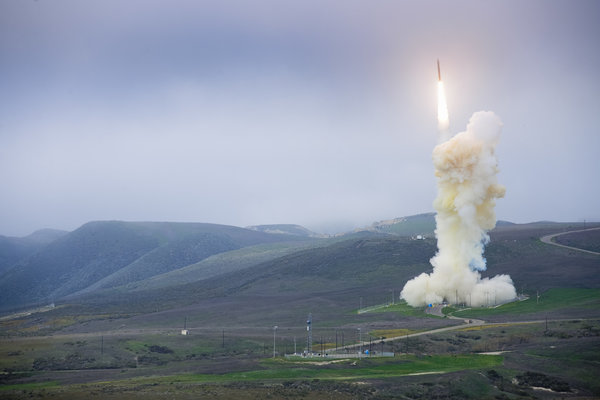Chinese perceptions of the U.S. national missile defense program are changing. Initial concerns about a technological arms race China could not win are gradually giving way to less alarming Chinese assessments. Most Chinese observers do not view the capabilities of existing U.S. missile defense technology as an immediate military challenge. But Chinese observers do see continued U.S investments in missile defense, particularly those that involve cooperation with nations on China’s periphery, as a cause for concern over the long term.

The Missile Defense Agency carried out a successful flight test of the Ground-Based Mid Course Defense. (Source: Missile Defense Agency)
China’s evolving views on missile defense are presented in a new UCS white paper.
Sensors vs. Interceptors
The current focus of Chinese concern appears to be on the ancillary intelligence gathering and surveillance capabilities the United States is putting in place during peacetime rather than the ability of U.S. defenses to intercept a Chinese missile fired during an actual conflict. Chinese military planners worry—justifiably or not—that the radars the United States is deploying in the region, including those that support missile defense, could be used to observe the testing or track the deployments of Chinese missiles. Combined with intensive U.S. monitoring of Chinese missile forces with satellites, and the U.S. refusal to take any military option including a nuclear first strike “off the table,” Chinese military planners confront what some perceive as an uncomfortably high risk of a disarming U.S. preemptive strike, either against the missiles themselves or against their command and control systems.
From China’s perspective, continued U.S. investments in a national missile defense present a serious challenge to the efforts of both sides to maintain strategic stability between China and the United States over the long term. The U.S. pursuit of a shield against nuclear attacks undermines Chinese confidence in U.S. assurances that greater Chinese transparency about its comparatively small nuclear arsenal would not undermine Chinese security. And China’s refusal to discuss the size and capabilities of its nuclear forces undermines U.S. confidence in Chinese assurances that China will not build up its nuclear forces as the United States and Russia scale down, or threaten to use its nuclear weapons during a future conflict with the United States.
Technological vs. Negotiated Solutions
Despite three decades of research and development, the United States has yet to produce an effective reliable defense against long-range ballistic missiles. But President Reagan’s 1983 decision to invest in this defense, which he promised would make nuclear-armed missiles “obsolete,” did spur the Chinese leadership to launch its own large scale, long-term investment in advanced military technologies, including kinetic energy interceptors like those being developed for the U.S. national missile defense program.
China has tested its own kinetic energy interceptors using missiles and a satellite as targets. In January 2007 the Chinese used the interceptor to obliterate an aging Chinese weather satellite, creating a large field of potentially dangerous debris that will remain in space for decades. China described its most recent test of this exoatmospheric hit-to-kill technology, conducted just last week, as a missile defense test. Chinese press reports compared the test to an 11 January 2010 test, which is described in detail in a U.S. cable issued the following day.
President Reagan’s technological utopianism, which, ironically, is also defining feature of Chinese Marxism, lives on among U.S. defense analysts who continue to believe national missile defense is a solution to the danger of nuclear-armed missiles. Common sense, as well as experience, suggests that a new defense merely begets a new offense, and in the case of national missile defense, countermeasures that can be easily added to missiles to defeat missile defenses are a lot simpler and much less expensive to successfully develop and deploy, even for technology-starved nations like Iran and North Korea.
The women and men who work in China’s defense science community understand the limiting technical realities of the U.S. national missile defense program. Throughout the history of the People’s Republic, China’s senior political leaders looked to their scientists and engineers for definitive guidance on Chinese nuclear weapons policy. These technically trained professionals see the continued U.S. pursuit of a national missile defense as antithetical to international efforts to reduce and eventually eliminate nuclear weapons. For them, missile defense is a security problem, not a solution, even though they now possess the same basic technology themselves.
In the words of one of China’s most influential arms control experts, who works in a center affiliated with the Chinese Academy of Engineering Physics,
“Historically, limitations on the development of strategic missile defense systems were a cornerstone of nuclear arms control. The development of strategic missile defense not only easily facilitates nuclear arms racing; it poisons relations between the nuclear nations, destroys strategic stability and makes deep nuclear reductions difficult to realize.”
